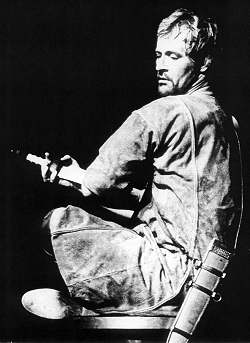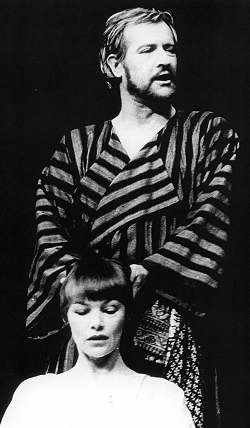
 |
|
Out of Peter Brook always something new. And although I don't think his production of Antony and Cleopatra at the Royal Shakespeare Theatre is going yet awhile to rank amongst his world beaters, it is certainly the product of a questing original mind. Its virtues (amongst which is the general level of acting) are considerable. Its faults are often inherent in the play itself. I take it Brook's intention is in part to domesticate the tragedy, to present it as a play of private emotion rather than public rhetoric. Cinematically speaking we are closer to the world of .... than Cecil B. De Mille, and Sally Jacob's set appropriately has a slightly eastern look to it. It consists of a ring of translucent panels which effectively divide the vast stage in half. In front of them one is in the world of turbulent emotion. Beyond them lies the world of battles, sea-fights, ignorant armies clashing by night. At one point the panels are savagely spattered with blood, a reminder of what lies beyond the privacy of palaces. This simplicity is clean counter to tradition. In the Redgrave-Ashcroft version at Stratford years ago, I remember a huge monument arising out of the ground like a mighty Miltonic exhalation; here a dark red cloth symbolises the monument and when Antony has to be hauled onto it, Cleopatra and her attendants simply drag him across the floor with the aid of their belts. |
 |
|
But precisely because Brook refuses to hide behind spectacle and rhetoric he highlights one of the crucial flaws in the play itself: its limping refusal to come to an end. Like that other love-tragedy, Romeo and Juliet, it assumes that two deaths are better than one. Having reached a magnificent climax with the expiration of Antony at the end of Act IV, the play itself expires, so that Cleopatra's death seems like an anti-climax. But although Brook can't disguise the play's structural fault, he does convey a sense of both rapture and gradual ruination: of two people treading the sweet path to disaster. He is brilliant at scenes of communal revelry and nowhere more so than in the famous gathering aboard Pompey's galley. The drunken world leaders enter with the faintly exaggerated tip-toe care of people half-cut. With the introduction of Richard Peaslee's music the tempo of the Bacchanal slowly increases. A boy singer, is rather suggestively whirled around Antony's waist like an Apache dancer: pillows are flung and benches overturned as the dancers circle the stage in leaps and bounds like minor Baryshnikovs, and eventually the floor cloth rises into the air and becomes a huge sail to the furls of which Antony precariously clings. It is a magnificent piece of voluptuous staging. The close encounters of Antony and Cleo also have a dangerous excitability: a feeling of two people on a headlong flight into ruin. After the defeat at Actium and Antony's whipping of a saucy messenger, Cleopatra spins around like a child seeing how far it can go without being sick and together she and Antony roll around the floor in berserk abandon. The more certain defeat becomes the more they become enslaved to passion. For this most cinematic play, Brook also uses a technique of fades and dissolves so that one moment melts into another, often with great poignancy. No sooner has Octavius at the end of one scene cried, "poor Antony" than we see the tottering hero entering for the next propped up by Enobarbus. But one reason why this play rarely gets done (this is only the fifth production at Stratford this century) is that it presents an almost superhuman challenge to the performers and here the protagonists rise handsomely to the occasion. Glenda Jackson's Cleopatra is certainly the most ferocious I have ever seen: no messenger is safe from a hair-pulling: she kicks her treasurer right around the stage and even Antony is often pummelled by her far from tiny fist. "You have been a boggler ever," Antony tells her: a Bugner would be more like it. But Miss Jackson also suggests the wit, the volatility and the genuine passion (witness her shriek of pain when she thinks Antony is dead). I find her wanting only in the final act where she resorts to clawing the floor with her nails (as in The Music Lovers) to denote anger and where she tries to circumvent the rhetoric by a hyper-realism. When Cleopatra tells us "realms and islands were as plates dropped from his pocket," Miss Jackson tries to imitate the image instead of accepting it for what it is: a glorious rhetorical lie. But it remains a bitingly shrewd and intelligent performance. Alan Howard's Antony conveys even more firmly a sense of tragic dissolution: not the usual grizzled roue going quietly to seed but a fighter and a leader consumed with self-disgust. Its a fiendish role because the actor has to suggest a glorious past as well as well as an ignominious present. But Howard gets both across. When he seeks battle, "by sea, by sea" it is with the fervour of someone hungry for honour. And when, after defeat, he cries "I follow that I blush to look upon" it is with the sunken head of one corroded by shame. Mr Howard is also unafraid of the big effect: witness his voluptuous caress of the blade that will kill himand his hand in hand walk with his servant, Eros, prefiguring his celestial encounter with Cleopatra. |
|
But it is characteristic of Brook that he makes no preliminary moral judgements on the characters. Instead of contrasting Alexandrian delights with the ruthless pragmatism of Rome, he lets character be determined by action. Thus Jonathan Pryce's fine Octavius Caesar emerges not as the usual ice cold schemer (which is how Antony sees him) but as a man of reckless passion with an unstinted affection for his sister, an envious regard for Antony ("my mate of empire") and a delight in revelry. Historically, Octavius was 20 years younger than Antony; and Mr Pryce seizes on this so that when he receives a letter dubbing him "boy" he enters whirling it around in a state of delirious frenzy. Patrick |Stewart's Enobarbus is also much more of the old sweat who has seen it all: he is a man as besotted on Cleopatra as his master and one who enters into Egyptian hedonism with sheer sensual enjoyment. What Brook has basically given up is a chamber version of a work usually played as a full scale symphony. The advantage is that it enables us to see the characters with sharper definition than usual. The disadvantage is that one loses something of the play's public background (kingdoms are at stake here as well as individual lives) and that exhaustion sets in after Antony's death. I don't think in fact that Brook has yet got the measure of the end (though I admired Richard Griffith's red-nosed relief as the asp-bearing clown). But like all Brook's work it raises vital questions and specifically suggests that the RSC style of black leather and trumpets for anything remotely historical is due for replacement by something less clamorous, and that the essence of tragedy is that you start with no fixed moral preconceptions. It's not yet a great production; but it will do very nicely to be going on with. |
 |
Michael Billington.
The Guardian, 11.10.78.